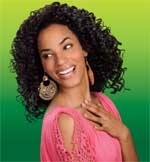HAIR ATTITUDE SURVEY: FINDING STRANDS OF TRUTH BEHIND STYLES AND IMAGES

According to the Hair Attitude Survey conducted by Sister2Sister and Sofn'free, females rank hair as the biggest determining factor in a woman's overall look.
If it's true that "clothes makes the man," then what makes the woman? According to a recent survey conducted jointly by Sister 2 Sister and Sofn'free, females rank hair as the biggest determining factor in a woman's overall look. They judged it as almost three times more significant than clothes and nearly six times more than makeup.
The nearly 700 minority women who participated in the survey, identified as black or bi-racial, are also the primary audience who reads Sister 2 Sister magazine and the main customer of Sofn'free GroHealthy products. Although more than half acknowledged that they have a good hair day at least once a week, this "mane" aspect of their appearance still appears unsettling to many.
Only 15 percent of the women noted that they were completely satisfied with their hair. Despite the abundance of hair care products on the market created to address dryness, the overall majority identified it as among their most troublesome hair problem. Their responses leave little wonder as to why the burgeoning hair-care market introduces new specialized formulas with frequency. The maker of Sofn'free GroHealthy, which has been creating products for textured hair since the early '80s, plans to introduce no fewer than 10 new items by early next year alone.
The surveyed women split almost equally into sets of those who use chemical hair relaxers and those considered having "natural hair."
* Both groups gave a nod to wigs, weaves, extensions (72 percent do not consider them "being fake").
* Both groups said they read ingredient labels on their hair-care and food products; however, the naturals group skewed higher.
* 80 percent of naturals typically read hair-care ingredients; 79 percent review food labels.
* 67 percent of the relaxed group read hair products, and 72 percent read food labels.
* Frequency of salon visits varied by group: 74 percent of Naturals visit less than once a month, compared to 50 percent of the relaxed group.
* Although both groups pointed to dryness as a major problem with their hair, the naturals found frizzes even more troublesome, and the relaxed group pointed to breakage.
* Both groups admitted that they spend more time weekly on their hair than they do cleaning, cooking, exercising or shopping for clothes. Typical daily time spent: 30 minutes or less.
The Naturals
Given the option to select one or more choices, an overwhelming 70 percent of the natural hair group selected the most compelling reason to opt out of the relaxer process was because they felt their route is healthier for their hair and scalp. Other reasons:
* 47 percent specified the chemical-free aspect
* 41 percent said that they preferred the look of natural hair
* 31 percent cited cost-savings as a reason
* 28 percent said natural hair is a way to show that they embrace their ethnicity
* 25 percent said natural hair gives an aura of confidence or a no-fuss, no-muss attitude
Generally speaking, the Naturals are enthusiastic about their hair preference; in fact, 61 percent claim to be "absolutely passionate" about it. Perhaps that explains why 57 percent admitted they have tried to convince other women to go natural too. Transitioning is a term to describe the growing stage from all relaxed hair to roots of natural growth that remain natural; if a woman chooses to cut off all the relaxed hair at an early stage of transitioning, she is said to have gotten the "Big Chop." This term, although seemingly common in the natural hair media, appeared to be relatively unknown to those surveyed, as indicated nearly a fifth asking what it means.
What does a Natural's hair say about her? Almost 40 percent thought natural hair gives the impression that the woman herself is natural. However, not every Natural wears her hair curly; some straighten it with the help of a flat iron, blow-dryer or wrapping ritual. Most who do said that these alternatives give them a choice of curly or straight hair at any time, followed by those who felt mechanical straightening lets them avoid potentially damaging chemicals.
The Relaxed Set
More than half of the women who relax their hair claim that someone has tried to talk them into going natural. Yet since an overwhelming 44 percent of the relax group claimed they are "borderline obsessed" with keeping their hair straight and smooth, it appears likely not everyone will be convinced to switch. Overall, more than half said they gave the nod to their chemical process because it makes their hair more manageable; about a quarter felt they simply prefer the look or the versatility relaxed hair offers. A trivial 1 percent admitted their man's preference was their deciding factor.
What do they think their straightened hair says about them? Most said they think others view them as feminine or easy-going because of their smooth tresses.
When given a list of celebrities from which to choose the "It Girl" of hair who best represent style and culture for African-American women, most Naturals selected Erykah Badu and Esperanza Spalding. Topping the celebrity list for the relaxed set were Gabrielle Union and Halle Berry. "It's hard to argue with any choice," said Sofn'free GroHealthy spokesperson Will Williams. "We think they're all beauties, from their hair to their toes."
Sister 2 Sister and Sofn'free opened The Hair Attitude Survey online to the public during August and September 2011. The marketing research firm of Moore & Symons tabulated the responses and results.
CONTACT:
Lisa Sperling
770-736-3573
lisa@sperling-pr.com
| This information has been distributed through BlackPR.com and BlackNews.com, |
You need to be a member of TheBlackList Pub to add comments!
Replies